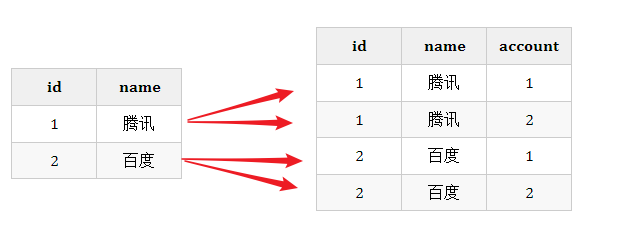使用LEFT JOIN 統計左右存在的資料
最近做了一個資料模組的統計,統計企業收款、發票相關的資料,開始統計是比較簡單,後面再拆分賬套統計就有點小複雜,本文做一個簡單的記錄。
需求
企業表
企業表t_company有如下欄位:標識id、企業名稱name:
| id | name |
|---|---|
| 1 | 騰訊 |
| 2 | 百度 |
收款表
企業對應有收款表t_collection有如下欄位:標識id、賬套account、企業idcompany_id、收款金額amount:
| id | account | company_id | amount |
|---|---|---|---|
| 1 | 1 | 1 | 30 |
| 2 | 2 | 1 | 20 |
| 3 | 1 | 2 | 30 |
| 4 | 2 | 2 | 40 |
開票表
開票表t_invoice有如下欄位:標識id、賬套account、企業idcompany_id、發票金額amount:
| id | account | company_id | amount |
|---|---|---|---|
| 1 | 1 | 1 | 10 |
| 2 | 2 | 1 | 20 |
| 3 | 1 | 2 | 30 |
| 4 | 2 | 2 | 50 |
彙總企業統計
現在要做一個統計,統計企業收款金額,以及發票金額,需要將收款表和發票表將company_id做group up操作。開票表也是做類似的操作,企業表和上面的結果做left join連線操作,sql如下:
select tc.id,tc.name,tc2.amount as collection_amount,ti.amount as invoice_amunt from t_company tc
left join (
select company_id,sum(amount) as amount from t_collection group by company_id
) tc2 on tc.id = tc2.company_id
left join (
select company_id,sum(amount) as amount from t_invoice group by company_id
) ti on tc.id = ti.company_id
查詢結果:
| id | name | collection_amount | invoice_amunt |
|---|---|---|---|
| 1 | 騰訊 | 50 | 30 |
| 2 | 百度 | 70 | 80 |
再分賬套做彙總(重點)
在上面統計的基礎上,再拆分賬套統計。

收款表和發票表做賬套的拆分,和企業表做關聯:
select tc.id,tc.name,tc2.amount as collection_amount,ti.amount as invoice_amunt from t_company tc
left join (
select company_id,account,sum(amount) as amount from t_collection
group by company_id,account
) tc2 on tc.id = tc2.company_id
left join (
select company_id,account,sum(amount) as amount from t_invoice
group by company_id,account
) ti on tc.id = ti.company_id and tc2.account = ti.account
首先是將收款表做賬套的拆分,然後關聯發票表的賬套拆分。看似沒有問題,但是left join返回左邊的所有記錄,以及右邊欄位相等的資料。

這樣就有一個問題:
如果左邊表沒有的資料,右邊的表也不會查出來。比如以上查詢收款表不存在的賬套,發票表存在賬套也不會查出來。這就是
left join的侷限性。
全表連線解決方案一:
MySQL有left join、right join應該也有full join全表連線。
但是
MySQL是不支援full join全表連線。
網上也有解決方案使用union替換full_join,思路是左表左連線右邊,左表右連線右邊,將上面的兩個結果union連線起來:
select * from t1 left join t2 on t1.id = t2.id
union
select * from t1 right join t2 on t1.id = t2.id;
上面只是兩個表的關聯,如果三個表或者更多的關聯,寫起來就比較繁瑣了。
全表連線解決方案二:
全表連線就是一個沒有限制的左表連線,就是去掉on關聯條件,
要left join所有的賬套,首先要顯示全所有的賬套,企業表關聯賬套表,但是兩個表是沒有關聯的,需要去掉on後面的關聯條件,但是MySQL語法連線後面必須要加on,將約束條件改成1 = 1即可:
select tc.id,tc.name,ta.id as account from t_company tc left join t_account ta on 1 = 1
| id | name | account |
|---|---|---|
| 1 | 騰訊 | 1 |
| 1 | 騰訊 | 2 |
| 2 | 百度 | 1 |
| 2 | 百度 | 2 |
查詢出所有的公司賬套之後,再left join收款表和發票表:
select tc.id,tc.name,tc.account,tc2.amount as collection_amount,ti.amount as invoice_amunt from (
select tc.id,tc.name,ta.id as account from t_company tc left join t_account ta on 1 = 1
)tc
left join (
select company_id,account,sum(amount) as amount from t_collection group by company_id,account
) tc2 on tc.id = tc2.company_id and tc.account = tc2.account
left join (
select company_id,account,sum(amount) as amount from t_invoice group by company_id,account
) ti on tc.id = ti.company_id and tc.account = ti.account
結果:
| id | name | account | collection_amount | invoice_amunt |
|---|---|---|---|---|
| 1 | 騰訊 | 1 | 30 | 10 |
| 1 | 騰訊 | 2 | 20 | 20 |
| 2 | 百度 | 1 | 30 | 30 |
| 2 | 百度 | 2 | 40 | 50 |
總結
- 企業分組統計收款和發票表,只需要對企業做
group by分組即可。 - 企業和賬套一起分組,
left join只會統計左邊存在的資料,而需要統計兩邊都存在的資料。- 使用
union多表查詢比較繁瑣。 left join使用on 1 = 1查詢不新增限制條件,查詢所有公司的賬套,再關聯發票和收款。
- 使用